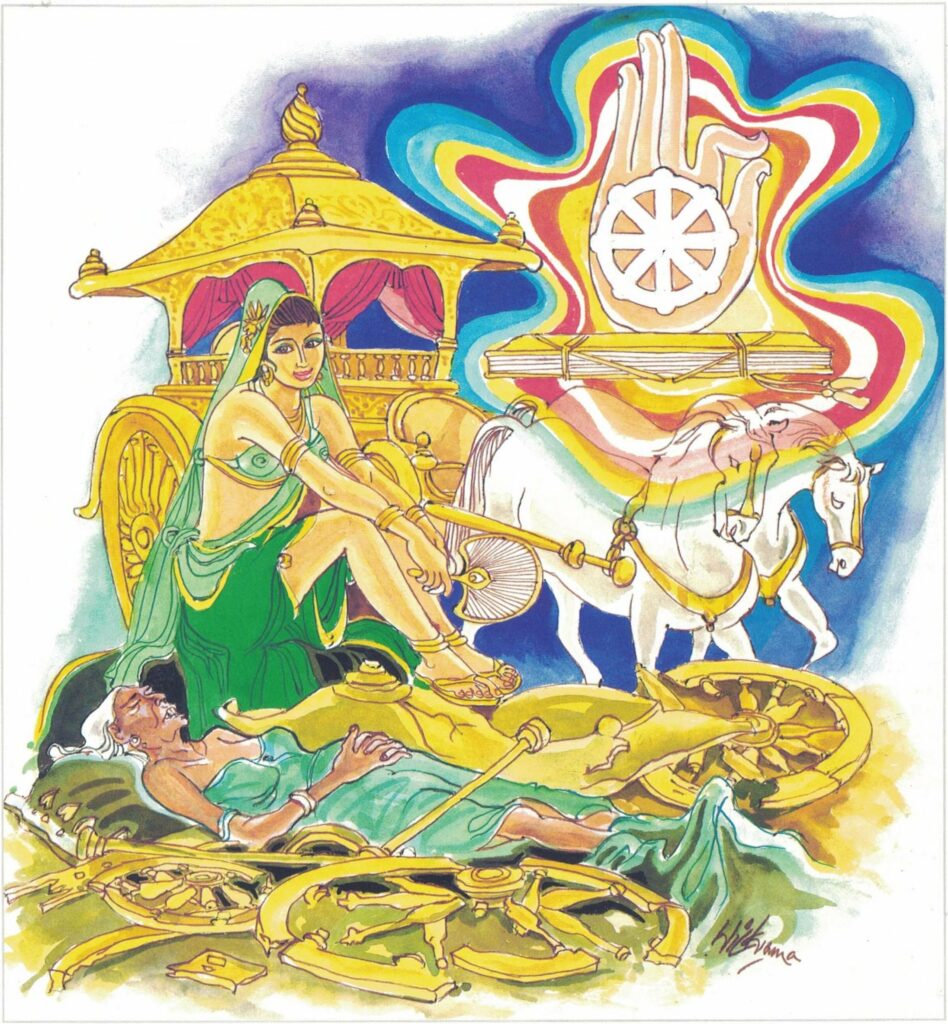Pali text, illustration and English translation of Dhammapada verse 151:
jīranti ve rāja rathā sucittā atho sarīrampi jaraṃ upeti |
satañca dhammo na jaraṃ upeti santo have sabbhi pavedayanti || 151 ||
151. Even rich royal chariots rot, the body too does rot, decay, but undecaying’s Dhamma of the Good who to the good declare.

The Story of Queen Mallikā
While residing at the Jetavana Monastery, the Buddha spoke this verse, with reference to Mallikā, queen of King Pasenadi of Kosala.
One day, Mallikā went into the bathroom to wash her face, hands and feet. Her pet dog came in; as she was bending to wash her feet, the dog tried to have sex with her, and the queen appeared to be amused and somewhat pleased. The king saw this strange incident through the window from his bedroom. When the queen came in, he said angrily to the queen, “Oh, you wicked woman! What were you doing with that dog in the bathroom? Do not deny what I saw with my own eyes.” The queen replied that she was only washing her face, her hands and her feet, and so was doing nothing wrong. Then she continued, “But, that room is very strange. If anyone went into that room, to one looking from this window there would appear to be as two. If you do not believe me, O king, please go into that room and I will look through this window.”
So, the king went into the bathroom. When he came out, Mallikā asked the king why he misbehaved with a she-goat in that room. The king denied it, but the queen insisted that she saw them with her own eyes. The king was puzzled, but being dimwitted, he accepted the queen’s explanation, and concluded that the bathroom was, indeed very strange.
From that time, the queen was full of remorse for having lied to the king and for having brazenly accused him of misbehaving with a she-goat. Thus, even when she was approaching death, she forgot to think about the great, unrivalled charities she had shared with her husband and only remembered that she had been unfair to him. As a result of this, when she died she was reborn in Niraya (hell). After her burial, the king intended to ask the Buddha where she was reborn. The Buddha wished to spare his feelings, and also did not want him to lose faith in the Dhamma. So he willed that this question should not be put to him and King Pasenadi forgot to ask the Buddha.
However, after seven days in niraya, the queen was reborn in the Tusita deva world. On that day, the Buddha went to King Pasenadi’s palace for alms-food; he indicated that he wished to rest in the coach-shed where the royal carriages were kept. After offering alms-food, the king asked the Buddha where queen Mallikā was reborn and the Buddha replied, “Mallikā has been reborn in the Tusita deva world.” Hearing this, the king was very pleased, and said, “Where else could she have been reborn? She was always thinking of doing good deeds, always thinking what to offer to the Buddha on the next day. Venerable! Now that she is gone, I, your humble disciple, hardly know what to do.” To him the Buddha said, “Look at these carriages of your father and your grandfather; these are all worn down and lying useless; so also is your body, which is subject to death and decay. Only the Dhamma of the virtuous is not subject to decay.”
Explanatory Translation (Verse 151)
sucittā rājarathā ve jīranti atho sarīraṃ api jaraṃ upeti,
sataṃ dhammo ca jaraṃ na upeti, santo sabbhi have pavedayanti.
sucittā: the well decked; rājarathā: the royal carriages; ve jīranti: certainly disintegrate; atho: similarly; sarīraṃ api: the body too: jaraṃ [jara]: decay; upeti: reaches; sataṃ [sata]: of noble person (like the Buddha); dhammo [dhamma]: the teaching; ca jaraṃ [jara]: decay; na upeti: does not reach; santo [santa]: those supremely disciplined persons; sabbhi: with good people; have: without any doubt; pavedayanti: communicate
Such beautiful and attractive objects as the carriages of kings also disintegrate. The human body too decays. But, the experience of truth never decays. The calm ones experience this truth.
Commentary and exegetical material (Verse 151)
While everything decays and dies, if one can maintain an unshaken mind, that calmness is the only stable experience which is known only to those who have achieved the serenity of Nibbāna.